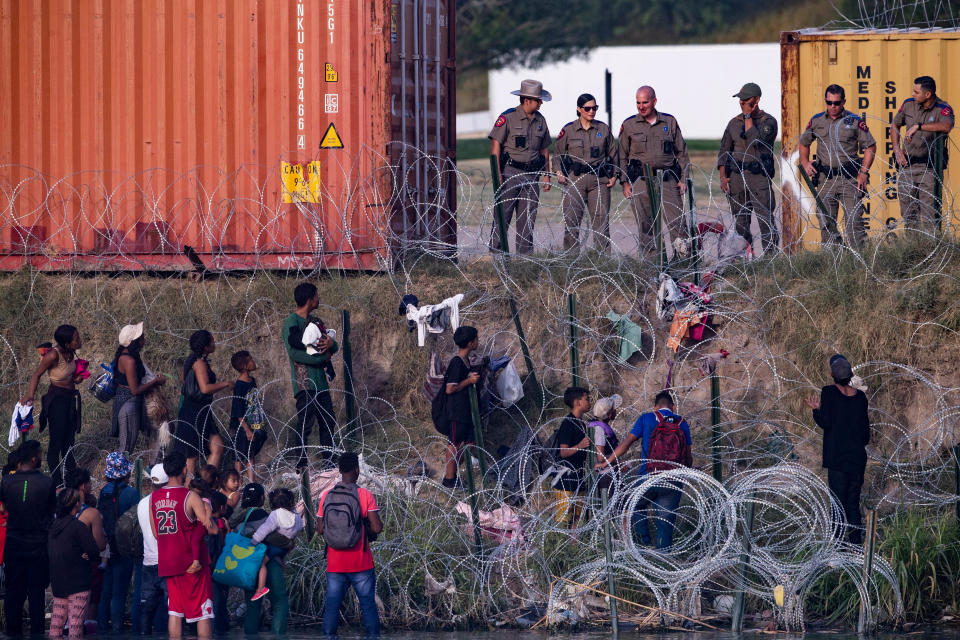In the US legal battle with Texas over SB 4, a court decision could have wide consequences
- Oops!Something went wrong.Please try again later.
The coming court battle between the Democratic Biden administration and Republican-run Texas over the state's new immigration enforcement law known as Senate Bill 4 could make the ongoing legal skirmish over buoys in the Rio Grande look like a tickle fight.
Though the feds were the first to the courthouse over SB 4, which was signed into law one week before Christmas, it's been clear all along that it's a battle Texas started because Gov. Greg Abbott and the GOP hierarchy think they can win.
"I like my chances," Abbott tweeted soon after the U.S. Justice Department on Wednesday filed the suit seeking to block the state law.
And if the governor's assessment is correct, the court action, which names him as the chief defendant, could rewrite the rulebook nationwide for immigration and border enforcement.

In a nutshell, SB 4, by Sen. Charles Perry, R-Lubbock, grants state law enforcement officials authority to arrest people suspected of crossing into Texas from Mexico without authorization between official points of entry. A conviction under the new rule, set to go into effect March 5, carries a six-month sentence, and anyone caught doing it again could face up to 20 years in prison.
More: Justice Department sues Texas over new state law allowing migrant arrests, deportations
The law also requires state judges to order such migrants back to Mexico and allows the judges to drop the charges against those who voluntarily pack up and go.
The feds, in their lawsuit, told Texas in effect to mind its own business. To back that up, they cited the 2012 Supreme Court ruling that slapped down a similar law enacted by Arizona after its Legislature had grown frustrated about then-President Barack Obama's approach to border security.
"Arizona may have understandable frustrations with the problems caused by illegal immigration while that process continues, but the State may not pursue policies that undermine federal law," then-Justice Anthony Kennedy wrote in the high court's ruling.
Abbott and the Republican leadership in the Legislature were well aware of Kennedy's words all during the run-up to SB 4. By moving forward with the measure, they were inviting the legal challenge they're now facing and were betting that the current, more conservative court would see the argument differently from how the court of a dozen years ago did.
"The supremacy of the federal government over states is not the question addressed by SB4, but rather the question addressed by SB4 is what happens when the federal government fails to utilize their supremacy for the defense and security of its citizens," said Perry, the bill's author. "Article I Section 10 gives the states the ability to defend themselves when there is a real threat of imminent danger. The data is overwhelming, undeniable, and clearly establishes that Texas is facing imminent danger."
After the 2012 ruling, the Arizona Legislature pretty much quit trying to meddle with immigration law. Texas did not. Witness the $11 billion border initiative called Operation Lone Star, which spawned the controversial decision by Abbott to order buoys placed in the Rio Grande to frustrate would-be river crossers near Eagle Pass.
That, too, prompted a federal lawsuit, which so far the feds are winning, but Abbott and Texas are hoping the Supreme Court will soon weigh in.
More: 5th Circuit rules Rio Grande buoys must be moved pending outcome of federal lawsuit
Let's say, for the sake of argument, the justices decide that a state has the right to place barriers in an international river to discourage unlawful immigration. That would pretty much affect only Texas, since no waterways separate Mexico from the other U.S. southern border states and swimming across one of the Great Lakes to enter the United States from Canada hasn't been been much of an issue.
But if the Supreme Court should uphold SB 4, it would open the door for other states to follow Texas' lead. And not just border states. Undocumented migrants who make it through Texas undetected might be subject to similar laws in Oklahoma, Arkansas and elsewhere. Or they might opt for states that choose not to follow Texas' lead.
That could lead to a hodgepodge immigration system across the country, and that is what the Supreme Court sought to squelch when it ruled in the Arizona case.
This article originally appeared on Austin American-Statesman: Why the legal battle over SB 4 might have reach far beyond Texas

